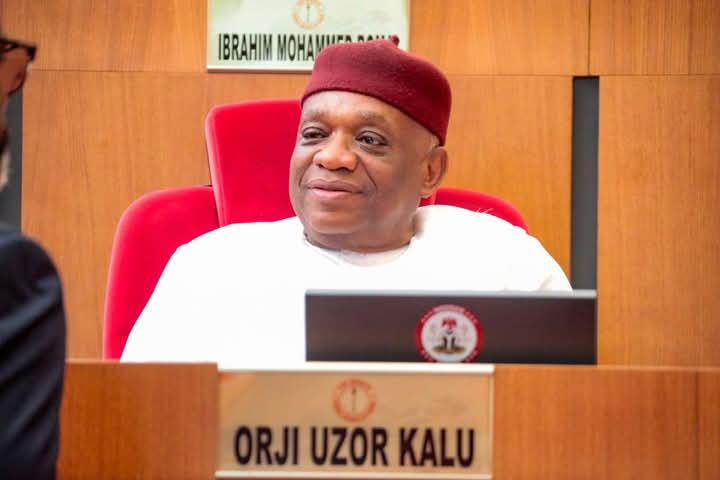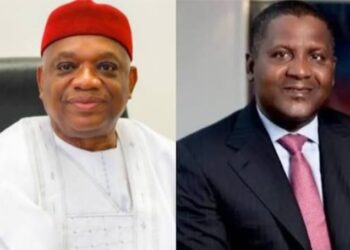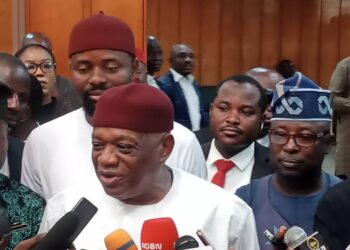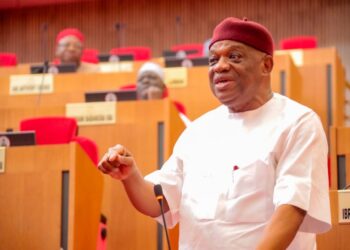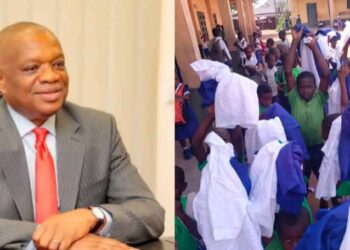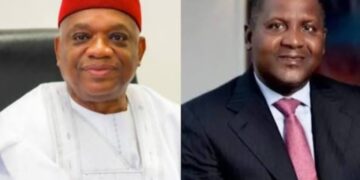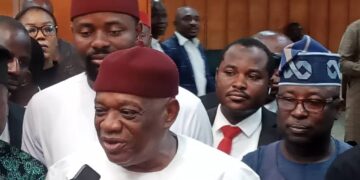As the Southeast geopolitical zone stands at a critical juncture, navigating the complex currents of Nigeria’s political future, a prominent socio-political group, the Southeast Progressive Forum (SPF), has issued a comprehensive statement urging a fundamental reassessment of leadership within Igboland.
The Forum champions the developmental, bridge-building, and pragmatic political approach of Senator Orji Uzor Kalu, presenting his extensive track record as a stark and superior contrast to the celebrated but ultimately failed political stance of Mr. Peter Obi.
In its detailed 2000-word analysis, the SPF calls on the youth wing of Ohaneze Ndigbo and other influential youth organizations to eschew the politics of emotionalism and social media populism. Instead, it advocates for a non-partisan, strategic engagement with the national political structure, arguing that Senator Kalu’s career provides a masterclass in achieving tangible results for the Southeast through experience, negotiation, and a deep understanding of Nigeria’s intricate power dynamics.
“The time for political romanticism is over,” declared Mazi Chijioke Nwosu, Chairman of the SPF, in the statement.
“For too long, our passionate and capable youth have been led down a path of partisan purity that has yielded little more than social media victories and political isolation.
“We must now look soberly at the records. We must ask ourselves: who has built the roads? Who has funded the schools? Who has sat at the national table and negotiated for the betterment of our people?
“The answer, unequivocally, points to leaders like Senator Orji Uzor Kalu. His legacy is one of bricks and mortar, of tangible progress, not just rhetoric and celebrated austerity.”
The Forum’s position is anchored in a detailed review of Senator Kalu’s extensive career, both as a two-term governor of Abia State and as a ranking senator and Principal Officer of the Nigerian Senate.
The SPF posits that Kalu’s governance model was predicated on aggressive infrastructural development and human capital investment, a philosophy desperately needed in a developing region.
“When Senator Kalu took the helm in Abia State in 1999, he inherited a state in dire need of foundational development after years of military neglect,” the statement reads.
“He did not choose the path of performative austerity; he chose the path of building. He pioneered a robust free education program at the primary and secondary levels that made Abia a model for the nation, understanding that the future of Ndigbo is secured not in saved bank balances, but in the educated minds of our children.
“He didn’t just patch existing roads; he embarked on an ambitious construction campaign, opening up rural communities and connecting commercial hubs, which unleashed economic activity across the state.”
The SPF highlights key achievements from Kalu’s tenure, including the extensive construction of roads in Aba, the state’s commercial nerve center, which had been left to decay for years. His administration is credited with a deliberate focus on urban renewal and the establishment of critical health facilities that increased access to care for the rural poor.
“Contrast this with the narrative we are often sold,” Mazi Nwosu stated. “Prudence is a virtue, but it becomes a vice when it leads to developmental stagnation. A leader’s primary duty is not merely to save money, but to invest it wisely in the people and in the future. Senator Kalu invested in the people of Abia, and the results are a lasting testament to his vision. He built institutions and infrastructure that outlived his tenure.”
The SPF points to Senator Kalu’s unparalleled feat of political engineering after his governorship. In 2007, he founded the Progressive People’s Alliance (PPA), a political party that, against all odds, won governorship elections in two Southeast states: Abia and Imo.
“This was a political masterstroke achieved without the tailwind of social media hype or populist rhetoric,” the statement notes.
“It was the product of ground-level mobilization, strategic thinking, and practical political intelligence.
“To dismiss these victories, as some critics do, by vaguely attributing them to ‘electoral malpractices’ is a disingenuous attempt to rewrite history.
“If every electoral outcome from that era is to be dismissed, then one must also question the very elections that brought Mr. Obi to power in Anambra. One cannot selectively apply skepticism to suit a preferred narrative.”
As a federal lawmaker, the SPF argues that Senator Kalu has consistently demonstrated a unique capacity to build bridges across ethnic and partisan divides, a skill crucial for securing the interests of the Igbo people in a multi-ethnic nation like Nigeria.
“In the Senate, as a ranking member, Senator Kalu has never been a provincial leader,” the statement continues.
“He understands that the progress of the Southeast is intrinsically linked to the stability and progress of Nigeria.
“He has used his considerable influence and national network to advocate for federal projects in the region, to negotiate for key appointments for our sons and daughters, and to ensure the voice of Ndigbo is heard, respected, and acted upon in the highest chambers of power.
“This is the difficult, unglamorous work of statecraft. It is the art of the possible, and it is a far cry from the politics of opposition and complaint.”
The Forum’s press release offers a sharp and methodical critique of Mr. Peter Obi’s tenure as governor of Anambra State, challenging the widely accepted narrative of his successes. The SPF argues that while Obi’s fiscal conservatism has been lauded by a captivated media, it came at a significant and damaging cost to the state’s long-term development and the welfare of its people.
“The central question of the Obi legacy is this: to what end were these celebrated savings made?” the statement asks.
“Nigerians, and Ndigbo in particular, were sold a powerful story of unprecedented fiscal responsibility.
“But what is the glory in leaving billions in the state’s coffers while critical infrastructure decays, while state-run hospitals remain underfunded, and while the government effectively abdicates its primary responsibility for education by handing schools back to missions without providing adequate, sustained state support for their modernization and upkeep?”
The SPF frames Obi’s governorship not as one of prudence, but of “developmental inertia” and a “philosophy of managed decline.”
“A state is not a personal savings account; it is a dynamic entity that requires constant, strategic investment to grow and to provide opportunities for its citizens,” Mazi Nwosu elaborated.
“The failure to invest in ambitious, large-scale infrastructure projects during a period of significant federal revenue and relative stability left Anambra lagging behind its peers.
“The so-called ‘Obi-dient’ movement was fueled by a powerful narrative, but a narrative built on a fundamentally flawed premise—that not spending is a greater achievement than building.
“For a developing region in desperate need of jobs, modern roads, industrial parks, and world-class public facilities, this philosophy is a recipe for stagnation.”
The Forum further argues that the political movement surrounding Mr. Obi’s 2023 presidential candidacy, while successful in mobilizing youthful energy, ultimately proved to be a strategic failure for the Igbo nation by promoting a brand of divisive and exclusionary politics.
“The ‘Obidient’ movement became a partisan echo chamber,” the release asserts.
“It was passionate, it was loud, and it dominated social media. But in the real world of Nigerian politics, where coalition-building and national consensus are paramount, it created a dangerous perception of Igbo political isolationism.
“It put all our political eggs in one basket, alienating us from other power blocs and ultimately failing to achieve its primary objective.
“The aftermath has left many of our youth disillusioned and politically adrift. True political progress for Ndigbo requires strategic engagement across multiple fronts, not a singular, all-or-nothing crusade based on transient enthusiasm.”
The core message of the press release is directed at the youth, whom the SPF acknowledges as the engine of the Igbo future. The Forum urges them to channel their admirable passion away from personality-driven, populist movements and towards a more pragmatic, strategic, and result-oriented political orientation.
“We issue a heartfelt and respectful appeal to the youth wing of Ohaneze Ndigbo and all Igbo youth,” the statement declares.
“Your energy is our greatest asset. Your desire for a better Nigeria is pure and powerful. But you must not allow that energy to be channeled into political cul-de-sacs.
“We urge you to adopt a non-partisan mindset in your evaluation of Igbo leadership. Judge leaders not by their rhetoric, their curated image of simplicity, or their social media popularity, but by their verifiable track record of achievements and their demonstrated capacity to build and to govern effectively.”
The SPF calls for a move beyond what it terms “the politics of sentiment” to “the politics of results.” It cautions against the empty threats and premature declarations of a “Ballot Revolution” in 2027, describing such rhetoric as a reflection of political immaturity and a distraction from the necessary work of building sustainable political structures.
“Let us be clear,” said Mazi Nwosu.
“Supporting a leader like Senator Orji Uzor Kalu is not about blind party affiliation. It is about recognizing a tested and proven ability to deliver tangible goods to the people.
“It is about supporting a leader who understands that negotiation and compromise are not signs of weakness, but are the essential tools of governance in a diverse federation.
“It is about choosing a leader who builds bridges, not one who stands on the other side of the river complaining that it is too wide.”
The Forum concludes with a powerful call to action, asking the youth to look at the tangible evidence of leadership and to make a choice based on a strategic vision for the future of the Southeast, rather than on fleeting emotions.
“The choice before us is clear and the stakes are too high for another strategic error,” the statement concludes.
“Do we follow the path of celebrated austerity, developmental stagnation, and political isolation? Or do we align with a proven builder, a seasoned administrator, and a master political strategist who has consistently delivered for our people and has remained a formidable force in the national arena?
“The Southeast Progressive Forum believes the future of Ndigbo lies in pragmatic, experienced, and nationally-connected leadership.
“That leader is Senator Orji Uzor Kalu. We urge the youth of Ohaneze to look at the facts, to discard the shackles of a failed and divisive partisan experiment, and to join us in the serious, necessary work of building a stronger, more prosperous Southeast for generations to come.”
For Press Release, Tip-off, Sponsored Post Contact Us: Whatsapp: (234)7038111972 | Email: info@abacitybloq.com


